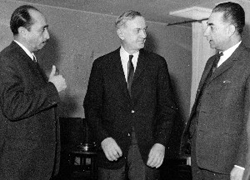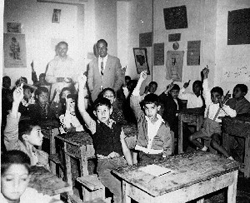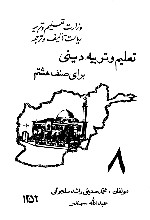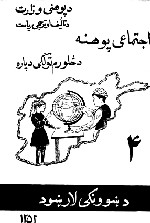The Afghan Project: TC Working with Afghans on Education
Using education to change the world is nothing new at TC.
In its largest international education project to date, Teachers College spent 25 years in Afghanistan working under the United States Foreign Aid Program, to help the Afghans build a modern education system using a program called the Afghan Project.
The Project was part of R. Freeman Butts's job as TC's director of International Studies from 1955 to 1975. He and his staff acted as consultants to Afghan educators who worked on expanding the number of schools throughout the country and increasing the number of trained educators. They accomplished a lot, including a full set of textbooks in Dari and Pashto, although much of the benefits were wiped out during the Soviet Invasion of December 1979, the civil wars that followed and the establishment of an authoritarian and fundamentalist Taliban regime.
Today, Teachers College is gathering a small working group and contacting a wide variety of American agencies to work out possible plans to resuscitate a new project, but perhaps with new directions, beyond the publication of textbooks. The College is exploring new ways to reach the Afghan people, said Barry Rosen, Executive Director of External Affairs and former Press Attache at the U.S. Embassy in Tehran.
"What strikes me overall is that these books are unlike the Taliban's method of teaching. They sought to institute the 'madrassah' system which strictly teaches the memorization of the Koran in a highly disciplined fashion and doesn't ask the students to think," said Rosen. "The textbooks created by TC and the Afghanistan Ministry of Education separated religion from the other disciplines and used the Socratic method to encourage thinking."
Rosen, who can read Dari, explained some of the books' contents. In a fifth grade science book, there are lessons on animals, plants, humans, earth, and technology. Hand-drawn illustrations accompany the text and depict objects or animals that would be familiar to Afghans.
"There are questions and answers about what was read at the end of the lessons," he said. "This shows students are not just memorizing, but thinking as well."
It is especially interesting to see the science books, he said, because there were no science lessons during the civil wars, the Russian occupation or under the Taliban.
Since the original Afghan Project is fully documented in the archives of the Milbank Memorial Library at TC, said David Ment, Head of Special Collections, UNICEF and other groups that are thinking about their potential in the new situation have contacted the Library recently to use some of the collection.
"These materials provide not just the basis for a new scholarly analysis but also some of the tools that will be needed for the new educational efforts in Afghanistan," he said.
The idea for the Project began after a 1949 UNESCO survey that found the greatest educational need in Afghanistan was teacher training, said Ment. The United States picked that idea up in 1954, and selected Teachers College to do the work, under contract with A.I.D. and its predecessor agencies. Ultimately there were several contracts, with overlapping beginnings and endings, running through about 1978.
The United States Government was also interested in Afghanistan because of Cold War geography. There was an anti-soviet alliance in those years linking the United States and Britain with Turkey, Iraq, Iran, and Pakistan, he said. The only gap was Afghanistan, so anything to spread American influence in Afghanistan was a contribution to our efforts in the Cold War.
During the first few years, the project concentrated on training teachers in high schools. The program was done in conjunction with the Ministry of Education and with teams of Americans and Afghans working together, said Ment.
Beginning in 1962, the program branched out into a project to develop a Faculty of Education for Kabul University. In 1966, it expanded further with a Curriculum and Textbook project to develop curriculum for all the primary schools of Afghanistan. It was designed to support it with an entire new set of textbooks, as well as teacher training. All subjects-language, social studies, math, science, health, Islamic studies-were included.
"To give you an idea about the size of these projects, I looked at one year where there were 35 Teachers College staff members and about 100 Afghan staff members working on various projects," said Ment. "Ultimately, the Project produced 75 textbooks-in Dari and Pashto-and that was just the tip of the iceberg."
In their first report, the TC team in the Afghan Project said that "the people of Afghanistan must speak for themselves. . . with respect to what they value most, what they want their schools to teach, and what they want their children to become. We have asked some of them, and we have encouraged both teachers and pupils to help us understand what the more important aims of education should be."
The team recognized the need to train Afghan professionals so that they could assume fuller responsibility for educational development. They said, "Our function is to advise. . . Even if we could learn to see, to think, to believe as the Afghans do, we would still insist upon the principle of Afghan responsibility. They are the ones who must live with whatever is developed."
To this end, the project sponsored training of the Afghan professionals at Teachers College and other schools in the United States as well as in programs closer to Afghanistan.
Ultimately, the entire educational leadership of Afghanistan reflected the training. In 1974, Ralph Fields, the Chief of Party said that "the Minister of Education, the first Deputy Minister, the second Deputy Minister, the President and the Vice President of Publications-the entire chain of command that looks at curriculum and textbook work-have degrees from the United States, five of them from Teachers College."
He also spoke of the larger goals of the program. "There are those who would limit the educational assistance undertaken to that which can be demonstrably justified in economic terms. My convictions are that our own self-interest is better served in the long run by what at first might appear to be pure altruism. In the long run the most serious threat to the technologically advanced nations is the continuance of the poverty and suffering, hence the unrest, of the so-called 'third world.' I am convinced that in the long run the only solution to the problems of poverty and suffering is through the development of the human resources in these countries," said Fields. "This development can be helped by the sharing of our technology and the development of their technology-technology in agriculture, in health and family planning-in my judgment the technology in other areas will prove to be temporary and ineffective."
All the work in drafting the textbooks and curriculum was done in an extremely careful and professional manner. The group from Teachers College did extensive curriculum research, studied language issues and children's vocabulary. They collaborated with the Ministry of Education and with the regional educators involved in review, said Ment. When they drafted textbooks, they tested them in schools all over Afghanistan and trained teachers to implement them. Teacher comments were solicited and used in revising drafts.
One of the first groups of textbooks was a set of fifth grade health books written in Dari and Pashto. In-service training workshops for teachers and inspectors were held in August in Jalalabad, Kandahar, and Mazar-e-sharif so teachers would be ready to use the books in September. Additional workshops were held in five other cities where the school year begins in March.
The team showed that they were aware of the difficulties of introducing these modern concepts where the legitimacy of the program and the whole idea of modernization were potentially controversial.
Although influenced by the small amount of more modern people that they worked with in Kabul, but they were realistic about the challenges of teaching modern curriculum in the parts of the country with a more feudal setup.
In reports on textbook distribution in 1976, they discussed the major workshop held in Jalalabad to introduce teachers to the textbooks and provincial inspectors. The inspectors held workshops in the various towns around the province to train other teachers. The textbooks were distributed and later the Project staff visited to see how it was going. There was some improvement, but they recognized that more would need to be done to make a modern curriculum a reality in rural districts.
In order to empower people of Afghanistan, said Afghanistan Project Coordinator Richard Whittemore in 1975, a liberal education is important. He added, it frees the mind from the hands of time and place, and is an education for change and development.
Unfortunately, Whittemore and his colleagues were unable to see the results of their efforts. The Soviet Invasion and the collapse of a central government meant the end of liberal education for Afghans, especially young girls and women. Nevertheless, the work of Teachers College did not disappear.
A casual observation of life in the refugee camps in Pakistan especially in Jalalabad reveals that Afghans still hunger for the textbooks that were published in the pre-Taliban period. This information has come to us through various refugee agencies that have been collecting and using the textbooks from TC's archives.
Who knows if these textbooks will be the foundation for the youth of a new and thriving Afghanistan.
"Much that was done before is still useful. Valuable as these textbooks are, the Afghan Project is far broader," Ment said. "Its usefulness in the future should not be overlooked or underrated."
Published Friday, Jan. 7, 2005



